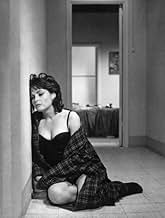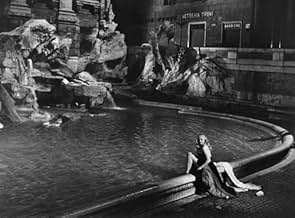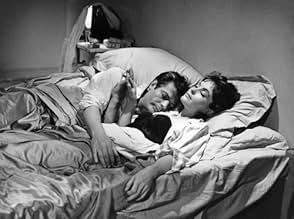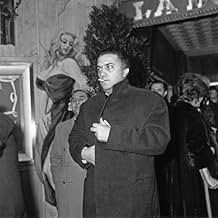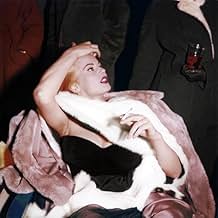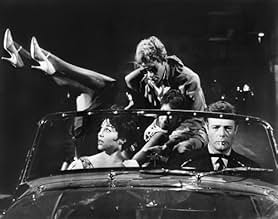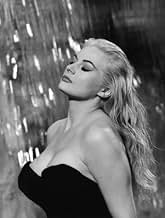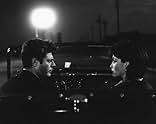La dolce vita
- 1960
- Tous publics
- 2h 54m
A series of stories following a week in the life of a philandering tabloid journalist living in Rome.A series of stories following a week in the life of a philandering tabloid journalist living in Rome.A series of stories following a week in the life of a philandering tabloid journalist living in Rome.
- Won 1 Oscar
- 11 wins & 12 nominations total
Anouk Aimée
- Maddalena
- (as Anouk Aimee)
Magali Noël
- Fanny
- (as Magali Noel)
Summary
Reviewers say 'La Dolce Vita' delves into themes of fame, decadence, and the superficiality of celebrity culture, using these characters to underscore the contrasts and contradictions within high society. The portrayal of it's characters enhances the film's satirical and critical perspective on the lifestyles and attitudes of the era, offering a nuanced commentary on the nature of fame and its impact on individuals and society.
Featured reviews
(first of all, sorry my poor english) Who, in this entire world, drunk as a horse in the middle of the night, never discovered the meaning of life, that it can be so easy and joyfull that hurts. This happens with a certain frequency. The big problem is, after all that, to face all the thoughts and conclusions in a sober monday morning, when everything is just real, concious and above all that sincere. This is the the big question and problem of Marcello Rubini, a reporter of a gossip magazines who has to deal with the fact that he tastes the same poison he spreads by leaving in a group of people which he sucks his living.
In a moment he is directing his papparazzi and, in the next, he is running away from them. He flows between all kinds of social circles and the only impression he gives is that it doesnt matter what kind of craziness you are getting into everything is a big cliché. From the mainstream world of a gorgeous actress who feels able to express opinions about everything (and we buy it), passing throught the religious world of the faith, and also an intellectual circle that gives a fake impression of freedom, everything turns out to be an escape. That blonde girl appears as a stroke of pureness and sincereness, something we should really look for, but we just dont. In the case of Marcello's life, writing is the solutions he always substitute for vain experiences. Something he likes and that he needs a young girl to tell him that. That litlle cute girl is a person Marcello would like to be, someone who faces the soberty of a monday morning with hopeness and happiness.
A masterpiece.
In a moment he is directing his papparazzi and, in the next, he is running away from them. He flows between all kinds of social circles and the only impression he gives is that it doesnt matter what kind of craziness you are getting into everything is a big cliché. From the mainstream world of a gorgeous actress who feels able to express opinions about everything (and we buy it), passing throught the religious world of the faith, and also an intellectual circle that gives a fake impression of freedom, everything turns out to be an escape. That blonde girl appears as a stroke of pureness and sincereness, something we should really look for, but we just dont. In the case of Marcello's life, writing is the solutions he always substitute for vain experiences. Something he likes and that he needs a young girl to tell him that. That litlle cute girl is a person Marcello would like to be, someone who faces the soberty of a monday morning with hopeness and happiness.
A masterpiece.
This is one of those films where I just don't want it to end as I enjoyed it so much. So many memorable and humorous scenes - Fellini successfully captured the atmosphere of picturesque Rome lifestyle. All of the characters are interesting, complex and I especially loved Anita Ekberg's performance! Amazing!
LA DOLCE VITA presents a series of incidents in the life of Roman tabloid reporter Marcello Rubini (Marcello Mastroianni)--and although each incident is very different in content they create a portrait of an intelligent but superficial man who is gradually consumed by "the sweet life" of wealth, celebrity, and self-indulgence he reports on and which he has come to crave.
Although the film seems to be making a negative statement about self-indulgence that leads to self-loathing, Fellini also gives the viewer plenty of room to act as interpreter, and he cleverly plays one theme against its antithesis throughout the film. (The suffocation of monogamy vs. the meaninglessness of promiscuity and sincere religious belief vs. manipulative hypocrisy are but two of the most obvious juxtapositions.) But Fellini's most remarkable effect here is his ability to keep us interested in the largely unsympathetic characters LA DOLCE VITA presents: a few are naive to the point of stupidity; most are vapid; the majority (including the leads) are unspeakably shallow--and yet they still hold our interest over the course of this three hour film.
The cast is superior, with Marcello Mastroianni's personal charm particularly powerful. As usual with Fellini, there is a lot to look at on the screen: although he hasn't dropped into the wild surrealism for which he was sometimes known, there are quite a few surrealistic flourishes and visual ironies aplenty--the latter most often supplied by the hordes of photographers that scuttle after the leading characters much like cockroaches in search of crumbs. For many years available to the home market in pan-and-scan only, the film is now in a letterbox release that makes it all the more effective. Strongly recommended.
Gary F. Taylor, aka GFT, Amazon Reviewer
Although the film seems to be making a negative statement about self-indulgence that leads to self-loathing, Fellini also gives the viewer plenty of room to act as interpreter, and he cleverly plays one theme against its antithesis throughout the film. (The suffocation of monogamy vs. the meaninglessness of promiscuity and sincere religious belief vs. manipulative hypocrisy are but two of the most obvious juxtapositions.) But Fellini's most remarkable effect here is his ability to keep us interested in the largely unsympathetic characters LA DOLCE VITA presents: a few are naive to the point of stupidity; most are vapid; the majority (including the leads) are unspeakably shallow--and yet they still hold our interest over the course of this three hour film.
The cast is superior, with Marcello Mastroianni's personal charm particularly powerful. As usual with Fellini, there is a lot to look at on the screen: although he hasn't dropped into the wild surrealism for which he was sometimes known, there are quite a few surrealistic flourishes and visual ironies aplenty--the latter most often supplied by the hordes of photographers that scuttle after the leading characters much like cockroaches in search of crumbs. For many years available to the home market in pan-and-scan only, the film is now in a letterbox release that makes it all the more effective. Strongly recommended.
Gary F. Taylor, aka GFT, Amazon Reviewer
I first saw this movie probably over 25 years ago when I was quite a bit younger. At that point I enjoyed it for its party scenes, sense of joy and life and vitality and....Marcello Mastroianni. Now that I'm older myself and have just recently seen the movie again, I find that I have a much deeper understanding of it. Maybe it takes some age to find some meaning. In a nutshell, Marcello is at a crossroads in his life, he's unable to settle down or move foreward into any direction - he's a diletante with aspirations but no real goals. He's wrapped up in himself and in projecting rather dreamy ideals onto other people. But as he keeps projecting on to others he comes to find in each situation that he doesn't really know the person and they are a mystery and probably a disappointment to him. certainly steiner is the biggest disappointment and disillusions him to a degree that he is apparently lost to a life of corruption and decadence as a result. but it's not that these people are difficult to understand to someone other than marcello - i think we can see that anita ekberg's character really is just a big good-natured blond and not the mysterious goddess marcello makes her out to be; his father is again - the typical traveling salesman and perhaps not the paternal figure that marcello would like him to be. his amour maddelena lives up to her name even as marcello starts believing himself in love with her - he's literally seduced by nothing more than an image he creates in his own mind. his friend steiner seems to have it all to marcello and to be the renaissance man that he would like to be - but, of course, he is dissatisfied and disturbed and we see what the end is. the only one whom marcello forms a somewhat realistic connection with is his girlfriend whom he treats badly and neglects despite her obvious love for him. he refuses to actually work on the one relationship that he could actually succeed at - he would rather dream about possibilities than actualize something.
marcello cannot communicate with others because he cannot see them as the people they really are - he just sees them as projections of his own needs, aspirations, desires and goals. when he finds out what they're really like, he either turns away or falls apart. this is an outstanding movie - 10 out of 10 and beautifully photographed. if you don't get it now, try again in 10 years - it will wait for you to catch up.
marcello cannot communicate with others because he cannot see them as the people they really are - he just sees them as projections of his own needs, aspirations, desires and goals. when he finds out what they're really like, he either turns away or falls apart. this is an outstanding movie - 10 out of 10 and beautifully photographed. if you don't get it now, try again in 10 years - it will wait for you to catch up.
Returning to this film after many years, I was mesmerized for its entire three hours and could have stuck with it for even longer. More than just a parade of degenerate Sixties Eurotrash, all of human life is captured in these frames, from prostitutes living in flooded slum apartments to glittering nobility in their crumbling castles.
The common thread is the thoroughly captivating Marcello Mastroianni as the gossip columnist/aspiring novelist, later turned burned-out publicist. His relationship with the parade of females who inhabit his world, often fleetingly, is nuanced and authentic feeling, while the episode with his father, who shows up for an unexpected visit, is a delight that brought a wide smile to my face.
The unique, episodic structure of the film feels neither showy nor forced, and the film moves through its segments with the natural grace of a great symphony.
An added bonus for me was seeing a young Nico of Velvet Underground fame , looking relaxed and happy. Would that things always turned out that way for her.
In sum, a totally unique tour de force and, unquestionably, one of the greatest achievements in cinematic history.
The common thread is the thoroughly captivating Marcello Mastroianni as the gossip columnist/aspiring novelist, later turned burned-out publicist. His relationship with the parade of females who inhabit his world, often fleetingly, is nuanced and authentic feeling, while the episode with his father, who shows up for an unexpected visit, is a delight that brought a wide smile to my face.
The unique, episodic structure of the film feels neither showy nor forced, and the film moves through its segments with the natural grace of a great symphony.
An added bonus for me was seeing a young Nico of Velvet Underground fame , looking relaxed and happy. Would that things always turned out that way for her.
In sum, a totally unique tour de force and, unquestionably, one of the greatest achievements in cinematic history.
Did you know
- TriviaThe famous scene in the Trevi Fountain was shot over a week in March, when nights were still cold. According to Federico Fellini (in an interview with Costanzo Costantini), Anita Ekberg stood in the cold water in her dress for hours with no trouble. Marcello Mastroianni, on the other hand, had to wear a wetsuit beneath his clothes, and even that wasn't enough. Still freezing, he downed an entire bottle of vodka, so he was completely drunk while shooting the scene.
- GoofsWhen Marcello and Maddalena arrive at the prostitute's apartment, a long electric cable (light?) can be seen attached to the right rear of the car, moving along until the car stops.
- Alternate versionsIn the original American release, distributed by American International Pictures, the titles open with the AIP logo and appear over a shot of the sky with clouds. In the current release on DVD - and as shown on TCM - the title sequence is over a black background. When originally released, censors in several countries trimmed certain scenes, including the orgy near the end of the film.
- ConnectionsEdited into La case du siècle: Cinecittà, de Mussolini à la Dolce Vita (2021)
Details
- Release date
- Countries of origin
- Official site
- Languages
- Also known as
- La douceur de vivre
- Filming locations
- Villa Giustiniani-Odescalchi, Bassano Romano, Viterbo, Lazio, Italy(abandoned castle scenes)
- Production companies
- See more company credits at IMDbPro
Box office
- Gross worldwide
- $217,420
- Runtime
- 2h 54m(174 min)
- Color
- Aspect ratio
- 2.35 : 1
Contribute to this page
Suggest an edit or add missing content

![Watch Trailer [English SUB]](https://m.media-amazon.com/images/M/MV5BNjE3MTU3OTItN2I0NS00YzU2LWE1ZTctZDQ3Y2I1NDc4MGMxXkEyXkFqcGdeQXRyYW5zY29kZS13b3JrZmxvdw@@._V1_QL75_UX500_CR0)
![La Dolce Vita: [2-Disc Collectors Edition]](https://m.media-amazon.com/images/M/MV5BZTY2ZTg3YmEtZDZkMS00MmFkLThhMjItMWVmN2NlNmJhZGZjXkEyXkFqcGdeQXVyNzU1NzE3NTg@._V1_QL75_UX500_CR0)

